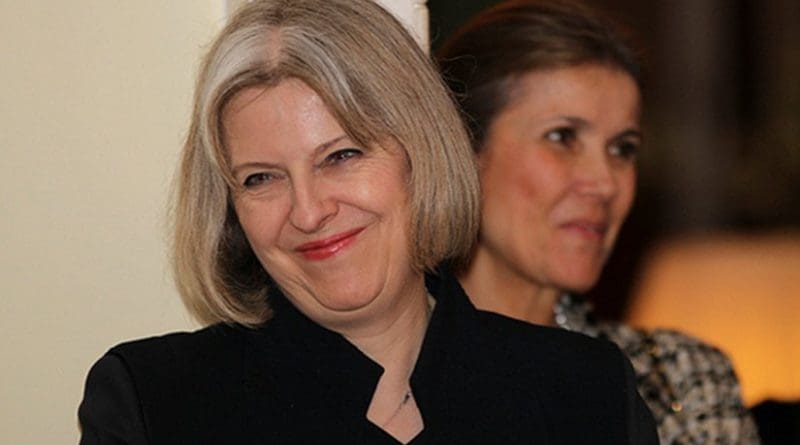Theresa May Front-Runner As Next British Prime Minister
By EurActiv
By Matthew Tempest
(EurActiv) — Britain’s Home Secretary Theresa May, who campaigned for the UK to remain in the EU, emerged this weekend as the front-runner to become the next British prime minister – amid the political wreckage created by last week’s Brexit vote.
There are now five Conservative party candidates to replace David Cameron, who stood down within hours of the 52-48% vote to leave the bloc.
After a summer-long contest a new prime minister will be announced on 9 September, without a general election. But there is as yet no clear signal when that PM will trigger the Article 50 which begins Britain’s two-year negotiation to leave the EU.
Meanwhile, during a ceremony at the Somme to mark 100 years since one of the worst military battles in European history, French President François Hollande warned London that the Brexit decision cannot be “delayed or cancelled.”
Speaking to reporters in northern France, Hollande said, “The decision has been taken, it cannot be delayed and it cannot be cancelled, now they have to face the consequences.”
Michael Gove, who was a major Leave campaign figurehead and is second-favourite behind May, said Friday (1 July) that if he won, he would not trigger Article 50 until 2017.
“I have no expectation that it would be triggered in this calendar year,” he said, adding: “We need to have some preliminary conversations… We will do it when we’re good and ready.”
That stance will inevitably come into conflict with the stated views of the Commission, EU Council, and various member states who have agreed to wait until the new PM takes office in September, but are unlikely to be patient beyond that.
Gove also pledged to end the free movement of people if he became PM, something that would hit both the roughly 3 million EU citizens in the UK, and the about 1.2m British living in the EU.
“I will end free movement (of EU nationals), introduce an Australian-style points-based system for immigration, and bring numbers down,” Gove said at his first campaign press conference.
Gove, along with Boris Johnson, were the official Conservative faces of the Leave campaign. On Thursday, Johnson sensationally quit the contest to be the next PM at his own press conference intended to launch his campaign.
Johnson’s camp blamed Gove for knifing him in the back. Gove had promised to back Johnson, before announcing his own canididacy in the morning, and declaring Johnson unfit to be leader.
But May is the current front-runner among bookies, after collecting the backing of dozens of MPs.
The current list of five candidates – May, Gove, and fringe candidates Liam Fox, Stephen Crabb and Andrea Leadsom, will be whittled down by the votes of MPs before going to a shortlist of two for a vote of the 150,000 party members.
May supported the “Remain” campaign but has assured “Leave” supporters she will proceed with Brexit although she said she would not begin formal talks with the EU before the end of the year.
The Daily Mail newspaper, an influential right-wing tabloid, endorsed May with a front-page headline Friday saying, “A party in flames and why it must be Theresa”.
The bitterly divisive campaign also exposed rifts within Labour, where leader Jeremy Corbyn has been heavily criticised for his lukewarm advocacy of the campaign to stay in the EU.
A large majority of Labour MPs have supported a vote of no confidence in Corbyn, a veteran socialist with wide grassroots support who only became leader last year.
But he has defied his parliamentary party to insist he will hang on, challenging them to mount a full leadership contest, knowing that last year he won an overwhelming 59.5% of members’ votes – in a field of four candidates.
In a sign of the economic, as well as financial turmoil, engulfing the UK, the Chancellor of the Exchequer on Friday abandoned his plan of eliminating the deficit by 2020, whilst the low-budget airline EasyJet announced it was in talks for its HQ to be relocated from the UK.
The pound crept back up on Friday after the Bank of England hinted it was ready to cut interest rates in the wake of the Brexit vote.
Osborne warned that the government would likely scrap its promise to achieve a budget surplus by 2020 due to the fallout from Brexit.
“We will continue to be tough on the deficit, but we must be realistic about achieving a surplus by the end of this decade,” Osborne told business leaders.
“This is precisely the flexibility that our rules provide for. And we need to reduce uncertainty by moving as quickly as possible to a new relationship with Europe and being super competitive, open for business and free trading. That’s the plan and we must set to it.”
Echoing the Bank of England’s gloomy forecasts from the previous day, Osborne added that Britain’s EU exit would exert a major “negative” impact on the economy.
“The referendum result is as expected likely to lead to a significant negative shock for the British economy,” Osborne said on Friday.
“How we respond will determine the impact on people’s jobs and on economic growth.”
Osborne added that there needed to be “compromises” if Britain wanted to secure certain aspects of the bloc – like access to the single market.
“There are going to be – as we come to the discussion over the coming months – inevitably combinations and compromises we are going to have to make to work out the best future for our country,” he said.
The referendum outcome triggered anger among those who wanted to remain in the EU. More than four million people have signed a petition calling for a second referendum.

